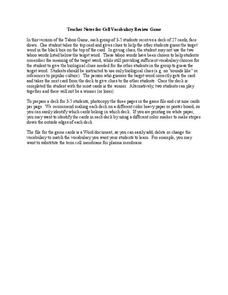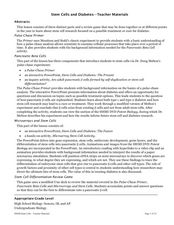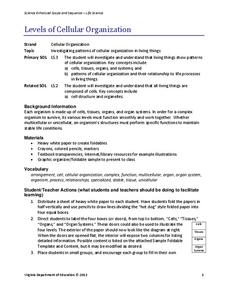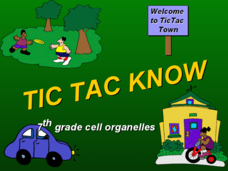Howard Hughes Medical Institute
Classroom Activities: Stem Cells and Diabetes
A multi-faceted lesson immerses AP biologists into the world of the stem cell. Using PowerPoint presentations, you introduce your class to diabetes and the possibility of finding cures through stem cell research. Online animations and...
Serendip
Cell Vocabulary Review Game
Can science scholars describe a nucleus without mentioning DNA, or a chloroplast without mentioning the color green? Test their organelle understanding through an exciting card game. Groups take turns guessing the correct organelle or...
Serendip
Mitosis, Meiosis and Fertilization Vocabulary Review Taboo Game
Can you describe a gamete without using the words sperm or egg? Scholars play a vocabulary review game where they try to get other players to guess their words. Each card has the target word as well as two related words they must not...
Science 4 Inquiry
Eukaryotic Cells: The Factories of Life
Eukaryotes include humans, animals, and plants. Scholars learn about the parts of eukaryotic cells. They design models of a store and match the correct function of each part to the function of a part of the cell. They review their...
Curated OER
Cell Game
Make a prototype of a game based on cell biology. Researching game design and working in groups to create a game will activate knowledge of cell biology. The review task will help students learning as they test out the games and their...
Curated OER
Stem Cell Differentiation Game Questions
Thirty-five multiple-choice questions are spread out into boxes bordered with dotted lines so that they can be cut out to become game cards. Playing a game to review concepts is an effective way to learn, even if you are in college. Give...
Curated OER
Cell Cycle, Mitosis and Meiosis
Seventh graders describe the processes involved in mitosis and meiosis. In this life science lesson, 7th graders create chromosome models using strings and beads. They play a jeopardy team game at the end of the unit to review concepts...
Cornell University
The Galvanic Cell Game
Play a little game with your classes! Young scholars expand on their understanding of oxidation/reduction reactions in a game-based activity. They build a Galvanic cell with game pieces while learning about each component and their...
Curated OER
Chalkboard Challenge: Science Vocabulary
Review science vocabulary with your students using this Jeopardy-style PowerPoint. Categories for this game include: Solar System, Plants, Weather, Cells, and Rocks. There are a total of 25 clues; five for each category.
Howard Hughes Medical Institute
Stem Cells and Diabetes
Learners investigate stem cells. In this science lesson, students discuss stem cells and view a video about human embryonic development. Learners conduct the pulse-chase.
Curated OER
Cell Reviews
Students draw cells, make a cell, and list organelles in plant and animal cells. In this cells lesson plan, students create edible cells.
Curated OER
Genetic Disorders
Students examine how living cells create new cells and how genetic mutations can cause disorders and be inherited. In this genetic reproductionn instructional activity students create their own PowerPoint presentation.
Curated OER
Science Jeopardy
Wow! Review an entire semester of biology curriculum playing this Science Jeopardy game! The variety of topics is extremely broad, so you will need to review each question to find if they all apply to your course. As you find material...
Curated OER
Genetic Disorders
Young scholars examine how living cells reproduce and how traits are passed on. In this genetic reproduction lesson students research a topic and present it to the class.
University of Minnesota
What's the Deal? Addiction Card Game
Addiction is a big deal! Playing a game of cards helps learners understand the concept of addiction. Through their analysis, they examine the potential for addiction and how it varies for each individual.
Jeopardy Labs
Third Grade Social Studies Review
In this interactive JeopardyLab game, with the assistance of a teacher, students can play against each other or in teams to review the content of Third Grade Social Studies. Allow the first team to choose a topic and a point value for a...
Virginia Department of Education
Levels of Cellular Organization
What an eccentric way to learn about each level of cellular organization! Allow emerging biologists to utilize white paper and create their own foldable charts to describe each level of organization in the body. You may also adapt the...
Curated OER
Science Jeopardy
Make reviewing evolution, cell division, genetics, cell structure, and scientific method more fun! Science Jeopardy allows teams to choose a category for the question they will address. If you complete the entire game, learners will have...
Curated OER
How Substances Get in and out of Cells
Although it contains some formatting issues, the Word document here contains good questions about osmosis and diffusion, and is easy to edit as needed. Designed as a study guide, you could use the information here for warmups, ideas for...
Curated OER
Tic Tac Know: organelles
Tic-Tac-Toe is a game most students will be familiar with. This fun activity prompts students to answer questions about cells organelles in order to place a mark on the grid. There are some non-essential humorous sound effects and...
Curated OER
The Virtual Electron Microscope
Students explore the world of the very small using a Flash plug-in Virtual Electron Microscope. They complete and discuss an activity in which unknown samples are placed under the computer simulated microscope to determine where the...
Curated OER
This is Jeopardy: Fifth Grade Life Science Review
This PowerPoint provides a Jeopardy game board and science questions from a variety of topics including biomes, plants, life cycles, cells, and the water cycle.
Curated OER
The Characteristics of Living Things
Eighth graders explore the characteristics of living things. In this living things lesson plan, 8th graders review as a class the cell theory and the characteristics of living things. They answer questions about how to determine if...























